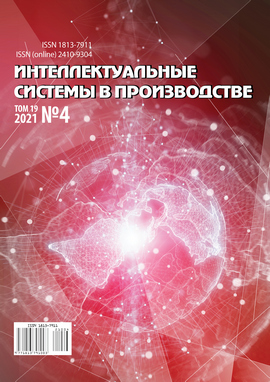Development of an Expert System for Diagnostic Postcovidal Syndrome
DOI:
https://doi.org/10.22213/2410-9304-2021-4-130-137Keywords:
expert system, diagnostic system, postcovid syndrome, system architecture, physical model, database, knowledge base, scoreAbstract
The paper is devoted to the development of an expert system for the diagnosis of postcoid syndrome. The introduction provides basic concepts and definitions related to expert diagnostic systems. An analytical review of them is given. Due to the lack of knowledge of the problem of postcovid syndrome in the work, much attention is paid to substantiating the relevance of the issue under consideration. Based on the analysis of the considered expert diagnostic systems, it was concluded that the problem is poorly studied and its further consideration is relevant. The proposed solution provides the main functions and capabilities of the system being developed, the structural diagram of the expert diagnostic system and the description of the system architecture, provides a physical model, and describes the developed knowledge base in sufficient detail. On the basis of the developed rules of the postcovid syndrome, the rules for their scoring are formulated. When calculating the final assessment of the likelihood of diagnosis of postcovid syndrome, the likelihood of influencing the diagnosis of chronic diseases in diagnosed patients was taken into account. The calculation algorithm is described in detail. The system for diagnosing the postcovid syndrome was developed using the C# programming language, Visual Studio 2019, and implemented under the Windows OS. The data storage layer in the system is built on the basis of a modern relational DBMS - MySQL. The paper describes in detail the procedure for working with the system and the procedure for editing it. When describing the testing of the proposed diagnostic system, it is stated that the diagnostic system has passed the testing of all functions; examples of changing the rule base and editing the system are given. In conclusion, it is argued that the diagnostic system proposed by the authors will help medical specialists in determining the postcovid syndrome in patients; in particular, it helps to increase the clarity, reliability of the diagnosis and reduce the time for diagnosis.References
Введение в экспертные системы. URL: http: // www.habarov.spb.ru/new_es/exp_sys/es01/es1.htm (дата обращения: 10.05.2021).
Джозеф Джарратано, Гари Райли. Экспертные системы: принципы разработки и программирование. 4-е изд. / пер. с англ. М. : И. Д. Вильямс, 2007. 1152 с.
Примеры известных экспертных систем. URL: https: //studme.org/158235/informatika/primery_izvestnyh_ekspertnyh_sistem (дата обращения: 01.06.2021).
Особенности проектирования медицинских диагностических систем. URL: https://cyberleninka.ru/article/n/osobennosti-proektirovaniya-meditsinskih-diagnosticheskih-sistem (дата обращения: 10.05.2021).
Басманов С. Н., Басманова А. А. Обзор экспертных систем с точки зрения соответствия основным признакам. Перспективы развития современных информационных технологий. URL: https: //cyberleninka.ru/article/n/obzor-evolyutsii-ekspertnyh-sistem-v-meditsine-s-tochki-zreniya-sootvetstviya-osnovnym-priznakam.
Ломакина Л. С., Соловьева И. В., Зеленцов С. А. Методологические аспекты диагностирования состояний многомерных объектов Фундаментальные исследования. 2015. № 7 (ч. 2). С. 328-332.
Токарев С. С., Телегина М. В. Модель экспертной системы медицинской диагностики Информатика и вычислительная техника: сборник научных трудов / под ред. Н. Н. Войта. Ульяновск : УлГТУ, 2011. С. 293-295.
Янников И. М., Телегина М. В., Гущина Д. А. Применение экспертной системы для определения уровня психологической пригодности к работе на риск-ориентированных должностях Интеллектуальные системы в производстве. 2019. Т. 17, № 2. С. 92-98.
Оразбаев Б. Б. Экспертные системы для медицинской диагностики с применением методов теории нечетких множеств ИТ-портал. 2016. № 4 (12). URL: https://itportal/ru/science/tech/ekspertnye-sistemy-dlya-maditsisko.
Положение модели искусственной нейронной сети в медицинских системах / Ю. А. Волчек, О. Н. Шишко, О. С. Спиридонова, Т. В. Мохорт Журнал Juvenis Scientia. 2017. № 9. С. 4-10.
Потёмкин Д. И., Лупаренко Е. В. Проектирование экспертной системы медицинской диагностики Знание. 2018. № 11-1(63). С. 48-53.
Постковидный синдром: описание последствий коронавируса. URL: https: // zn48.ru/articles/postkovidnyy-sindrom-osnovnye-priznaki-i-reabilitatsiya /(дата обращения 10.05.2021).
Справочник MSD. (2015-2021). URL: https: //www.msdmanuals.com/ru-ru/news/editorial/2020/09/23/20/17/post-covid-syndrome (дата обращения: 10.05.2021).
Оценка интенсивности болевого синдрома. URL: https: //pro-palliativ.ru/blog/otsenka-intensivnosti-bolevogo-sindroma (дата обращения: 07.06.2021).
Итинсон К. С. Экспертные системы и врачи: плюсы и минусы Наука и практика регионов. 2019. № 3 (16). С. 54-57.


